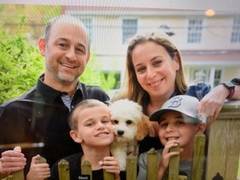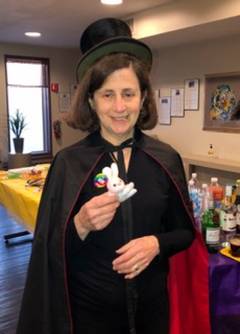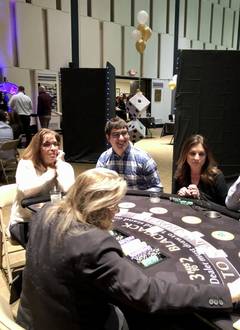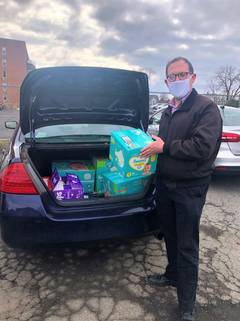You are My Servant, Israel, in Whom I Will be Glorified (Rosh Hashana Day 1 5786)
09/24/2025 07:53:51 PM
Rabbi Ben Goldberg
| Author | |
| Date Added | |
| Automatically create summary | |
| Summary |
I distinctly remember when, as a camper at a Jewish summer camp, we would prepare for day trips outside of camp. These were exciting opportunities to leave the camp bubble and do something fun with friends. In addition to making us memorize the camp phone number–which I still know to this day– should we somehow get separated from the group, our staff also gave us a stern warning about our behavior on these trips. We were not simply representing ourselves, we were told, and not only our camp, but, in fact, the Jewish people altogether. How we behaved reflected not only on ourselves but on every Jew on planet earth, and even, perhaps, on God.
Now, this is a lot of pressure to put on a simple outing to an ice cream parlor or a petting zoo. And maybe our staff were trying just to scare us into behaving properly on the trip. But I think they were also on to something real. After all, we were in fairly rural places where there were not many Jews, and we were an identifiably Jewish group. It’s quite possible that we were the first Jews someone would have ever encountered. And that came with responsibilities: to be respectful guests in the places we visited, to say please and thank you, to not leave behind a mess for someone else to clean up. As Jews, we represent not only ourselves, but also something bigger than ourselves.
As Shakeapeare said, all the world’s a stage, and anything anyone does sends messages, intended or not, to those watching. But for us, as Jews, for better and for worse, this dynamic often becomes heightened. Our choices and behavior represent not only ourselves individually, but the Jewish people collectively. This is why many of us experience vicarious pride at another Jew’s accomplishments, and vicarious shame at another’s Jew’s misdeeds.
We gather today having ended a year in which it has been extraordinarily precarious to be Jewish in public. I see the world through Jewish-focused lenses, but even still, it really does seem that we are once again at the center of some of the most important debates happening in our own society. And: being Jewish in public once again carries some real risk of harm. Three events last spring emphasized the danger: the arson of the official residence of Pennsylvania Governor Josh Shapiro, one of the most prominent Jewish elected officials, on seder night; the attack on the Run for Their Lives solidarity gathering for the remaining hostages in Boulder, Colorado; and the murder of two young Israeli embassy staffers at a Jewish event in DC that was focused, of all things, on increasing humanitarian aid in Gaza. And then, there are the much less violent, but much more common, reactions that being Jewish in public sometimes elicit: the awkward look, the intense question, the social ostracization.
So: how can we be Jewish in public in this precarious moment? To think through that question, I want to turn to a pair of terms from Jewish tradition: kiddush hashem, the sanctification of the Divine Name, and hillul hashem, the desecration of the Divine name. The notion is that a Jew’s behavior has the potential to enhance or detract from God’s reputation, God’s name, in the world, adding sanctity to the world, or not. This is the same word kiddush that may be familiar from Shabbat and holiday celebrations. But rather than sanctifying these sacred times over a cup of wine, we sanctify God’s name through our actions.
This idea has its roots in the command to the priests in Leviticus: “Do not desecrate My holy name, that I may be sanctified among the Children of Israel. I am the Lord who sanctifies you.” As the centuries went on, this idea developed further to the notion that the behavior of Jews reflects, well or poorly, on no less than God. This was particularly true for rabbis and sages who were meant to be not only experts in Torah, but embodiments of it. In this vein, a fourth century Talumudic sage, Abbaye, taught that the commandment to love God meant making the name of God beloved through one’s exemplary behavior. A Jew who behaves with kindness and high moral standards reflects well on his or her parents, teachers, and ultimately on God, fulfilling the verse from Isaiah: “You are My servant, Israel, in whom I will be glorified.”
Jews who take this concept seriously hold themselves to the highest ethical standards, in order to sanctify the Divine name. For example, last March, a young yeshiva student found a backpack full of cash and jewels in the back of his Uber home from the airport. He immediately turned it in to a community watch group, who reunited the valuable bag with its owner. Stories like this circulate for educational purposes in Jewish communities, encouraging Jews to bring glory to God through their everyday actions.
The concept of kiddush Hashem gives us tremendous power and responsibility. It was a risk on God’s part to entrust the Divine reputation to a specific group of people whose behavior may not always flatter it. But kiddush Hashem is also a risk for us. Beginning in the Second Temple period, kiddush hashem became a term for the martyrs, those who chose death at the hands of their persecutors rather than violate the core commitments of Jewish law or convert to another religion. Jews did not and should not seek out opportunities for martyrdom. Unfortunately, though, those opportunities found them, leaving an indelible imprint on Jewish life.
Our liturgy today on Rosh Hashanah bears this imprint. Each line of Avinu Malkeinu is either a plea for Divine rescue and assistance or a reason for God to do so. Several of those lines reference the legacy of Jewish martyrdom, using the language of kiddush hashem: “Avinu Malkeinu!” we proclaim, “act for the sake of those who went through fire and water al kiddush shemecha, for the sanctification of Your Name.”
This Rosh Hashanah, I cannot chant that line without thinking of Karen Diamond. Karen, a 82-year old woman, participated in the Run for Their Lives hostage gathering in Boulder, CO that was attacked with Molotov cocktails. She died from her injuries a few weeks later. Like so many martyrs before her, Karen went through fire in order to sanctify the Divine Name, in her case, through performing the mitzvah of pidyon shvuyim, redeeming captives.
When we mention these holy souls in Avinu Malkeinu, we call on the merit of those who made the ultimate sacrifice to burnish God’s reputation in the world, those who gave up their lives rather than abandon God and the Jewish people. We plead with God: God, we’ve already lost so much for being your loyal representatives in this world. How about a little mercy, a little forgiveness, a sweet new year, in exchange?
While there are still those who give up their lives for kiddush hashem, who are targeted simply because they are Jewish, thankfully, that is not the case for the vast, vast majority of us. Yet, even without the extreme circumstances that result in martyrdom, kiddush hashem is our overarching mission as Jews. We exist as a people in order to reflect well on God and to bring holiness into the world through our actions. We perform kiddush hashem not only through how we sometimes die, but much more importantly, through how we live: our everyday actions, how we use our time and money, the ways we remain steadfast to Jewish practice and community even when it would be easier not to, as is usually the case.
In this sense, kiddush hashem is our tradition’s inoculation against anti-semitic persecution. No matter what story others tell about us, we can always return to our own story for strength and reassurance. Indeed, we survived through centuries of persecution on little but the power of this story. While others denigrated and were disgusted by Jews and Judaism, Jews told themselves that they were God’s beloved people, charged with a particular mission for humanity that was worth living and, if necessary, dying for.
Sometimes, this attitude is entitled “Jewish pride.” I understand why some might employ that term, especially as a corrective to the kind of uncomfortable embarrassment about Judaism that non-Jewish society sometimes makes us feel, in ways subtle and explicit. Personally, “pride” has never resonated with me: Jewish sources tend to speak negatively about pride, seeing it as haughtiness or self-absorption. I also worry that talk of pride can lead too easily into a kind of chauvinism, where we think we’re better than other people, which we are not.
Instead, I prefer to see kiddush hashem not as pride, but as confidence: a strong internal sense of self that cannot be shaken, even by loud voices trying to drown it out. We know who we are, why we are here, and what our story is. And with that confidence, we can appear as Jews in public, understanding both the risks and also what is at stake.
What gets in the way of this Jewish confidence, this kiddush hashem? In her new book, entitled As a Jew: Reclaiming Our Story from Those Who Blame, Shame, and Try to Erase Us, former White House speechwriter Sarah Hurwitz reflects on the thin Jewish identity she had until she began to study Judaism more seriously as an adult. This identity was based on minimal observance of a few holidays, an ironic embrace of stereotypical Jewish traits like anxiety and humor, and a vague sense that Judaism was about being a good person and social justice. Hurwitz thought this identity was freely chosen. But looking back through Jewish history, she traces how it was actually shaped by attempts by modern Jews to desperately reassure their Gentile neighbors that they weren’t all that different from them after all, at least not in a way that could threaten the dominance of Christianity and its secular inheritors.
Hurwitz also notes how this desperation can manifest internally as a certain kind of shame in or defensiveness of Judaism. She recounts meeting a non-Jewish woman who mentioned her Jewish friends and that she had recently attended a brit milah, a circumcision, for her friend’s baby. Hurwitz found herself becoming instinctively, and weirdly, defensive of this ancient practice, asserting its medical benefits and safety. But her interlocutor had raised no such questions, and only expressed appreciation for the opportunity to take part in such an important moment. Upon reflection, Hurwitz realized this was her internalized shame speaking, desperately trying to reassure a random non-Jew that Jews aren’t that strange or different after all.
Obviously, this is not an attitude of kiddush hashem. We can keep desperately trying to edit and explain ourselves to fit somebody else’s idea of who we should be. But the horizon of such respectability politics will endlessly recede before us. Each historical era has surfaced some new objection to our collective existence: our religious beliefs, our loyalty to each other, our supposed race, our nationalism. There is no reason to think that this will change in the future.
Given that, our alternative is kiddush hashem. Thank God, almost always this will not involve actual martyrdom. But often, it will involve the willingness to boldly live out our values and commitments, regardless of what anybody else thinks.
This kind of Jewish confidence or kiddush Hashem is what enables us to engage in the repentance that this season demands of us. When we know who we are and why we are here–to bring holiness into the world through the means offered by Jewish practice and thought–we can then honestly assess how well we have accomplished that goal. And, in a world that tries to exercise its power over us, we can exercise the power that we do have: over our own actions. We can hold ourselves to the highest ethical standards of our tradition. We can strive to always be better versions of ourselves. We can do whatever we can to make God look good and earn the respect of our neighbors.
We engage in this process individually. But we also do so collectively, asking together whether we are fulfilling our people’s mission of being a kiddush hashem, a collective whose actions reflect well on our Torah and our God. We ask whether we are bringing holiness into the world, as difficult as that always is. We ask whether we are worthy of the sacrifices of previous generations who enabled us to be here today.
This new year in particular presents a particularly challenging moment in which to ask these questions. We find ourselves nearly two years into this terrible war in Gaza. Dozens of hostages, living and not, remain in captivity. Despite the tremendous firepower brought to bear, and its impressive successes on other fronts, Israel has been unable to conclusively defeat Hamas, and is instead bogged down fighting under conditions that would challenge any army’s capacity and moral code. So many soldiers have died and so many more have had to put their lives on hold while they fight. And, the war has reverberated around the world, continuing to surface lies, unfair criticism, and demonization that is often rooted in the historical legacy of antisemitism.
And yet: Zionism meant a Jewish return to power. Not the imagined power of a delusional antisemitic fantasy, but real power. An army. An economy. A state. And with that power comes responsibility. And yes, that includes a responsibility for self-defense and self-preservation. But Israel’s responsibilities do not end there.
If our mission as a people is to be a kiddush hashem, that must include space for heshbon hanfesh, for the self-critique that is the hallmark of this period of the year. This is not about appeasing our haters or enemies. They will hate regardless. And yes, there are considerations about how exactly to go about this, so as not to become an antisemite’s token “good Jew.” But we cannot let the enemies of the Jewish people determine our own sense of who we are.
Confident Jews, kiddush hashem Jews assert the right to tell our own story for ourselves, to determine for ourselves who we want to be. Confident Jews, kiddush hashem Jews, are open-eyed about the dangers we face both from within and without. Kiddush hashem Jews reject simplistic narratives that assert that the State of Israel is either inherently, uniquely moral or inherently, uniquely immoral. Kiddush hashem Jews seek to live our Jewish values, to bring holiness into the world, precisely in the situations where it is most difficult to do so.
All of this means that it is our duty to ask questions of ourselves and about what is being done in the service of the Jewish people. Some of these are questions about geopolitics and military strategy. Others are about morality in warfare or a long-term vision for the future. I don’t have answers to these questions, not certain ones anyway. But I do know that asking them is a kiddush hashem.
Asking these questions is a sign that we have confidence in the moral power of our Torah and its transcendent values. Asking is a sign of confidence that we recognize hard questions, moral dilemmas, and complex situations as such, and are not afraid to consider them in their fullness. Asking is a sign of confidence in the necessity and righteousness of our existence, such that it cannot be shaken by reasonable doubts and concerns.
Each of us here may have different answers to these questions. There’s a lot of right to go around. But the conversation itself must be a kiddush hashem: the honest striving of confident Jews to best live out our collective mission, applying the values of our tradition to situations our ancestors could scarcely have imagined.
And yet, even with our questions, our focus must remain on what is most in our control, the way we live our day to day lives as confident, kiddush hashem Jews. All of these involve showing up publicly and confidently as Jews. That can mean participating in our local Run for Their Lives gathering, which meets every Sunday morning. It can mean participating in Jewish events here at KTI and beyond, even when there are lots of other demands on your time. It can mean participating in a Jewish Employee Resource Group in your workplace and sharing what Judaism means to you with your colleagues with humility and confidence. It can mean participating in charitable efforts with our neighbors, like Food to Grow On, as an expression of your Jewish values and commitments. It can mean studying Torah and rooting your confidence in the depths of our tradition. And, most importantly, it means doing all of this with your children or grandchildren or other younger Jews in your life. Role model what it looks like to be a confident, kiddush hashem Jew. Do good in the world, and do it as a Jew.
I conclude with the following poem by the Israeli-American writer Sarah Tuttle-Singer:
As a Jew I opened my tent to the stranger.
As a Jew I was barren, blessed, and threw my head back and laughed.
As a Jew I walked out of Egypt barefoot.
As a Jew I saw both Temples burn.
As a Jew I was driven from Spain, from Poland, from Baghdad.
As a Jew I wept by all the rivers.
As a Jew I was mocked in markets, chased through forests, spat on in streets.
As a Jew I heard the sermons that cursed me and the mobs that followed after.
As a Jew I buried our dead by the millions and still lit Sabbath lights and vowed “next year in Jerusalem” — not as a dream, but as a promise.
As a Jew I came home — to fields of stone and salt, to a land both broken and blooming.
As a Jew I saw our children murdered on buses, in pizzerias, at festival grounds.
As a Jew I grieved on October 7 when the music stopped and the fire fell.
As a Jew I still grieve, and I still sing.
As a Jew I will not trade pride for your pity.
As a Jew I will not lay down our story as your welcome mat.
As a Jew I am not your scapegoat, not your alibi, not your symbol.
As a Jew I will not be your token Jewish friend.
As a Jew I will not beg for your applause.
As a Jew I will not willingly sharpen your knife against my people.
As a Jew I argue in every generation.
As a Jew I ask questions with no easy answers.
As a Jew I turn text into fire and silence into song.
As a Jew I carry memory forward not as chains, but as wings.
As a Jew I carry paradox like a sacred offering.
As a Jew I keep planting even in scorched earth.
As a Jew I make life holy with wine, with bread, with light, with all the people in our tent.
As a Jew I am covenant.
As a Jew I am defiance.
As a Jew I am brilliance, survival, creation, and joy.
As a Jew I am the wild and willful dream created when my ancestor wrestled God.
As a Jew I endure.
As a Jew I rise.
As a Jew I return.
Tue, October 21 2025
29 Tishrei 5786
Photo Gallery
Photo Albums
Upcoming Events
-
Wednesday ,
OctOctober 22 , 2025Rabbi, May I? Modern Responsa
Wednesday, Oct 22nd 10:00a to 11:30a
Wednesdays, 10 - 11:30 AM, KTI Library Ever since Abraham’s famous argument with God, Judaism has been full of debate. Moses and Korah, David and Nathan, Hillel and Shammai, the Vilna Gaon and the Ba’al Shem Tov, Spinoza and the Amsterdam Rabbis . . . the list goes on. No wonder that Judaism cherishes the expression machloket l’shem shamayim, “an argument for the sake of heaven.” Beyond their historical importance, what makes these disputations so compelling is that nearly all of them, regardless of their epochs, are still being argued. The parade of characters spanning three millennia of biblical, rabbinic, and modern disputation reflects the panorama of Jewish history with its monumental political, ethical, and spiritual challenges. This series will examine Jewish responses to exile from the biblical period to our modern day. Considering texts from all genres of Jewish literary creativity, we will explore how the realities and iterpretaions Join as we re-open these timeless debates that lead us to the core of 3,000 years of Jewish conversation. • Justice: Abraham vs. God (October 19) • Holiness and Authority: Moses vs. Korah (November 9) • Inclusion: The Five Daughters vs. the Twelve Tribes (November 30) • Accountability and Morality: David vs. Nathan (December 21) • Resistance: Ben Zakkai vs. the Zealots (January 18) • Law: Hillel vs. Shammai (February 15) • Spirituality: The Vilna Gaon vs. the Baal Shem Tov (March 15) • Boundaries: Spinoza vs. the Amsterdam Rabbis (April 19) • Religious Evolution: Geiger vs. Hirsch vs. Frankel (May 10) • Zionism: Herzl vs. Wise (May 31) -
Wednesday ,
OctOctober 22 , 2025Wrestling with God
Wednesday, Oct 22nd 8:00p to 9:30p
Wrestling with God Wednesdays, 8-9:30 PM Congregants’ homes TBA We need to talk about God. And about how we talk, and don’t talk, about God. It’s a big topic, maybe the biggest. This offering invites adult learners into compassionate inquiry, deepening their relationship to Jewish text through collective exploration. Using the album s*ngs ab-ut g?d [https://open.spotify.com/album/6JEY2AN6awAxNfWwmXX460] by Jewish educator Eliana Light as a starting point, this series blends music, Hebrew text study, and open-ended questions to help participants examine their own connections to the divine. This is sacred work. It’s not about getting it right. It’s about showing up with curiosity, humility, and a willingness to join the long lineage of Jews who wrestle with God. Each session stands alone, but we’d love to have a consistent group as much as possible. Dates: September 10: skyman October 22: shadows November 19: in the silence December 10: if only January 21: lead me back February 11: three steps March 11: beyONEd April 29: the mountains May 20: the name June 17: I rise -
Thursday ,
OctOctober 30 , 2025Coffee with the Rabbi
Thursday, Oct 30th 8:00a to 9:00a
Start your morning with some caffeine and casual or meaningful conversation! Join Rabbi Goldberg for a Coffee Chat! Stop by Rye Ridge Starbucks any of the following Thursdays, between 8-9am: June 12 and 26 July 10 and 24 August 7 and 21 September 4 and 18 October 16 and 30 November 6 and 20 December 4 and 18 -
Saturday ,
NovNovember 1 , 2025Dror Israel Shabbat
Shabbat, Nov 1st 11:30a
Dror Israel Shabbat Dror Israel’s Mirit Sulema, along with two leaders of the Arab Youth Movement NOAL, Tal Tunik and Shadi Habiballa, will speak during a Kiddush lunch about their important work with Arab Israeli youth and bringing Jewish, Arab, and Druze youth together. Saturday, November 1st, approx. 11:30am KTI Social Hall "We eat together, laugh together. We talk about what we think of each other, and what will help bring peace.” RSVP Appreciated -
Saturday ,
NovNovember 1 , 2025KTI Gala - A November to Remember Digital Journal
Motzei Shabbat, Nov 1st 7:00p to 10:00p
Privacy Settings | Privacy Policy | Member Terms
©2025 All rights reserved. Find out more about ShulCloud






